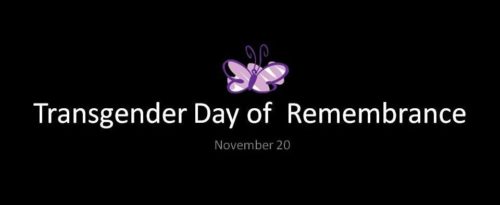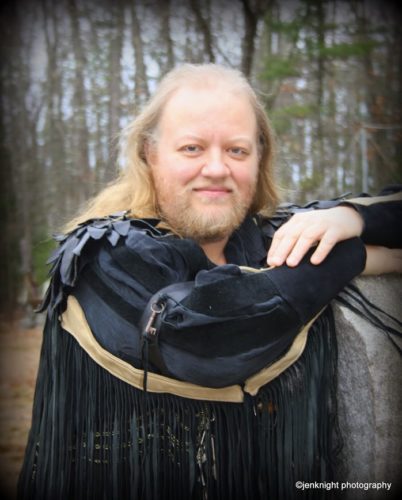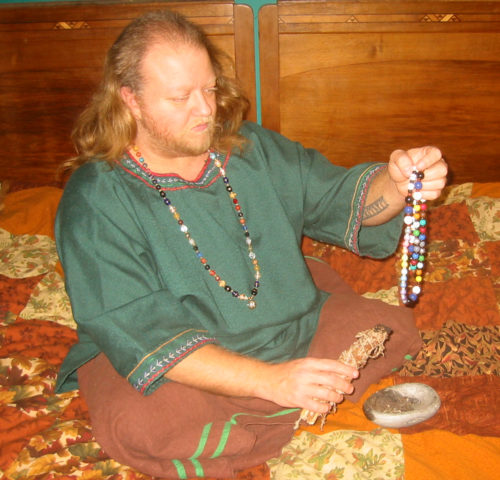TWH – Tomorrow marks the 18th annual Transgender Day of Remembrance. Around the world, organizations and individuals will be hosting events, memorials, and vigils to remember those who have been lost due to transgender-related violence. It is a powerful day – one that is part of a larger month-long transgender awareness campaign.

Held every Nov. 20, Transgender Day of Remembrance (TDoR) marks the death of Rita Hester, who was murdered in her Boston apartment in 1998. The case remains unsolved to this day. A year after her death, writer Gwendolyn Ann Smith held a vigil in San Francisco to honor Hester’s life and to bring awareness to the issues faced by transgender people. The 1999 vigil became the very first Transgender Day of Remembrance. Shortly after, other awareness campaigns and movements were launched, including a website for remembering those who have died.
18 years later, the movement has grown. Throughout November, activities are held, culminating in the day of remembrance. The TDoR campaign’s main site hosts a list of not only the worldwide activities, but also the names of people who have died as a result of transgender-related violence over the past year.
Each year around TDoR we invite a transgender member of the collective Pagan communities to join us to talk about personal experiences and about TDoR.
This year, we welcome author, activist, and educator Raven Kaldera from Massachusetts. Kaldera is an FTM transgendered intersexual shaman in the northern tradition,a minister in the Pagan church of Asphodel, and one of a growing number of speakers for the trans dead.
Kaldera has edited and authored 39 books, including Hermaphrodeities: the Transgender Spirituality Workbook. Kaldera says that he has been “a trans activist, a teacher of alternative relationships, a sex educator, a builder of bridges and a walker between worlds, and a troublemaker, for over two decades.”
He lives with his “large crazy polyamorous family on a little homestead.” He adds, “They have voted [me] the Evil Overlord of the Transsexual Empire, and built him the website as a birthday gift.’Tis an ill wind that blows no minds.”

[Courtesy.]
Raven Kaldera: We definitely have more press than we used to, and thus more public awareness. Ironically, I think more of that is because of celebrities like Chaz Bono and Caitlyn Jenner, and the occasional trans character in films and TV, than anything that the trans demographic is actually doing in and of themselves, but at least we’re not quite the mythical beasts that we used to be. Is this a good thing or a bad thing? I think it’s a necessary thing, first and foremost. We aren’t going to get anywhere if we are a dirty secret that everyone is supposed to pretend doesn’t really exist except for occasional freaks on talk shows.
People need to know that we could be your neighbor, your mail carrier, your dentist, your coworker, anyone you run across in your life, and that’s not a big deal. Part of being more visible, however, is that by definition we are more visible to haters – the people whom it’s impossible to reach with reason or compassion, who need to hate something because of their own internal pain. . . . haters gonna hate, and sometimes they will turn that hate into violence, which puts us in danger. I know that some of the older transfolk I know, who transitioned decades ago when we were just all mythical beasts to most people, are not happy because they are more easily recognized and it’s harder to hide. I respect their fear, and I know the very real danger that it comes from, but at the same time that’s a necessary side effect of getting where we need to go with regard to the goal of social acceptance.
TWH: What do you believe is the biggest threat to the community’s safety? If you could wave a wand to change one thing that would make the biggest impact, what would that one thing be?
RK: It’s hard to nail down any one thing, but if you go to the core of what causes homophobia and transphobia — and those are different things, but the latter comes directly out of the former in the minds of the haters we’re talking about — it’s conservative, fear-based religion of all sorts. Even people who aren’t religious and don’t like transfolk, when pushed, come down to, “I can’t explain it but I just think it’s wrong,” and what they mean is, “I was taught it was wrong and I’m not interested in challenging that social programming,” and who built that social programming? Conservative, fear-based religions.
And the answer is that transfolk — and active allies of transfolk — who belong to those religions, or at least to more liberal versions of those religions, need to do religious activism within their faith communities to change that. Even if there will be super-conservative holdouts, if things change in the more mainstream faith demographics— if transphobia becomes clearly a fringe extremist position — that’s going to change things.
TWH: With that in mind, how can non-trans people can be the best allies? What should cisgender people do or not do to help raise awareness, support their friends and eliminate the barriers discussed above?
RK: This follows right up on my last answer. Pagans who read this will say, “But I’m not in one of those religions! How can I help?” It is true that we can’t directly attack the core of the problem in that way, because our faith didn’t create that. We can do interfaith work, however, and be an example to members of those other faiths with whom we establish friendly and respectful relations, and in order to be a good example, we need to get our own houses in order. This means being positive about transfolk and their spiritual worth and value, and understanding that this is not only a biological reality but a sacred spiritual path of its own, even if it’s one that you don’t understand – because who understands all spiritual paths that aren’t your own? No one. Appreciating them as a good thing for others, that we can do. Learning about them, we can do that too. Educating one’s self leads to figuring out the most effective way to educate others.
Pagan groups that are built on the initiatory mysteries model need a small intimate group to work with, as opposed to large congregational-type groups such as the one I belong to. i think it’s OK to decide who gets into those groups by whatever personal criteria you want, whether it’s “only left-handed pink-haired piano players” or anything else. In bringing this up, of course, I’m referring to the various issues with gendered groups and the place of transfolk there. I think that the key to having an exclusive group without being trans-negative (or anything-else-negative) is to a) be very clear about the public language you use to describe your group members, and make sure that it is an inoffensive as possible, b) show an honest appreciation of the value and sacredness of people who don’t fit with your special-interest group, and c) bother to come up with a list of places to refer them to when they come knocking.
This includes small intimate initiatory groups supporting the concept of larger congregational-style Pagan groups, and possibly supporting those larger groups in more practical ways as well, because they’re doing the inclusivity thing that you’ve chosen not to. If you do claim to be an open and welcoming Pagan group, as opposed to a limited mystery tradition, act like it! Open your arms and your minds and find ways to make your group spiritually accessible to as many minority interests as possible. Be a welcoming congregation for real. Find out what the liberal-to-radical ends of other faiths are doing with that, and learn from them, and share ideas when you’ve nailed down some good ones.
Above all, make friends with transfolk. If you don’t have any in your circle of friends, why is that? Bother to ask the question and examine your life.

[Courtesy.]
RK: We need more discussion and creative thought around spiritual resources for transfolk and the clergy who minister to them. When I published the first edition of Hermaphrodities, no one had ever published a gender transition ritual before. When modern Paganism was first starting out, we didn’t have a lot of rituals and prayers for coming-of-age ceremonies, for divorce ceremonies, for funerals and such. Now we have plenty of them. That came about because we accepted it as a need, and accepted that there should be many versions because Pagans have a multitude of traditions. We need to accept that transfolk will be around, and they also need a variety of resources, and apply ourselves to it.
I’d like to see rites for transition in many traditions. I’d like to see coming-of-age rites for a teen who feels they are a different gender from their early assignment, or feels they are both male or female. I’d like to see prayers that a non-trans friend or relative could say to protect a trans loved one, and I’d like to see thoughtful discussion as to what gods would be best invoked for such a prayer. I’d like to see resources for non-trans Pagan clergy who are faced with the issues of a trans group member who needs counseling or divination or a ritual or whatever, just as there would be resources for a group member who is trying to get pregnant or who is having trouble in school or whose loved one has just passed on. I’d like to see theological discussion about the gender-transgressive natures of some gods, and what that means for us, both trans and non-trans. As a faith demographic, we are incredibly creative – we just need to apply ourselves to it!
TWH: Often when talking about marginalized, oppressed, and silenced populations, we focus on the struggle, violence and pain. Take a moment to share something beautiful about the transgender community or about being transgender: a story or even a moment?
RK: I remember once seeing a Star Trek: the Next Generation episode where there was a planet-ful of people who were neither male nor female and it upset me, because they were portrayed as all dressing and looking alike, and there was an emphasis on the lack of their two clear genders as being the reason for this carbon-copy mentality. I don’t know what the writers were trying to do, but they’d obviously never been in an actual room with 50 people who were not traditionally gendered, because we are an amazing rainbow of human beings! Our experience with not being locked into one physical and/or mental gender can often allow us to loosen our mental bods not just between male and female, but between human and animal, human and spirit, and many other dualities as well. Once we get over our trauma, we have an open doorway to being a wider spiritual being, in a way that non-trans people have to use other channels to explore. It’s an automatic one for us, though; it is only our emotional baggage that prevents us from stepping — or falling — through it.
I’m a transgendered intersexual, meaning that I was born with an intersex disorder — congenital adrenal hyperplasia — and was reared female, and transitioned to male for reasons both personal and medical. I refer to my gender as “male of center.” I can hold energy that is almost-but-not-completely male, almost-but-not-completely female, and various shades of both. Learning to do that taught me how to hold many other shades of energy as well. For me, the pain of body dysphoria and the trauma of an unaccepting world eventually became the fire through which I was forged as a person with many fewer limits of self. I am less likely to say, “I could never become the sort of person who could do that,” and more likely to say, “Hey, look at how I did transform myself! How can I say what isn’t possible with me?” I think that might have taken me a couple more lifetimes to achieve this fully if I hadn’t been through this fire that forces us to transform ourselves even in the face of disapproval. Not that people can’t get there by other means, but I don’t know that I could have, at least as quickly and as thoroughly as it happened.
Also, we have the gift of perspective. There’s a zen saying: “Which fish discuss water? The drowning ones.” I think that any academic who is studying questions of gender should make a point of getting the opinions of at least a dozen transfolk, because we are the controls. Our perspective on how men and women interact, socially and hormonally and maybe even spiritually in some cases, is going to be very different from the fish who are only just beginning to question the quality of their water.
We are the cross-quarters between the elements – fire and air, water and earth, all the other combinations. We are the living reflections of gender-transgressive gods – Agdistis and Dionysos, Shiva and Baphomet, Athena and Lilith, Loki and his serpent son-daughter, and many others. Nature takes many forms and does not confine itself only to binary gender, and neither does human experience.
TWH: What does Transgender Day of Remembrance mean to you? Why is it important?
RK: It is many things. It is most literally a way to honor people who died by violence through no fault of their own, because of unjust and harmful social ideas. Murdered trans bodies are an obvious form of this memetic dysfunction. It’s harder (though, sadly, not impossible) for self-righteous people to justify that hatred in the face of a long list of wrongful dead. By speaking for the murdered trans dead — an angrier population of ghosts than any other I’ve had the privilege to work with — we let them know that they are not forgotten, not swept away so that the same problems will continue.
However, it is also a time of ancestor worship for me. In my personal shamanic tradition, we honor five types of ancestors: of the blood (genetic relations), of the heart (beloved non-related dead), of the mind (those whose words inspired you), of the spirit (those whose deeds inspired you), and of lineage (those with whom you share a bond of experience greater than wherever you came from). The trans dead are my ancestors of lineage. I claim them as ancestors, all of them – or, rather, they claimed me, and charged me with speaking and writing about them, as well as doing ritual and pouring out the pomegranate juice. (Pomegranate juice has become the traditional libation for them, in honor of the hermaphroditic god Agdistis, which was tricky back in the days when it wasn’t as popular and speakers for the trans dead had to search for tiny little bottles of it in the grocery store.) They are as much my ancestors as my blood kin and perhaps more, because they watch my back. If you are transgendered by whatever definition you care to use, you have the right to call on them as ancestors to help keep you safe. What they want most is to stop the senseless killings of those of their tribe, of our tribe. This holiday is the first official holiday of this tribe.
On the other hand, a transwoman sitting next to me at a TDoR once said to me, as the shaman of our tribe, “It pains me that the only holiday for this tribe is one of pain and mourning. Find me another one, to balance that.” I’m still working on that problem. When the time is right, it will blossom, as we are blossoming and coming into our own, with our own mysteries, our own sacred rites, and our own place at the table of humanity.
TWH: Thank you for taking the time to share your thoughts.
* * *
For those people who are attending organized vigils tomorrow or for those would like to participate in their own way privately or with their own groups, on the TDoR is posted the list of 2017 victims of anti-transgender violence. There are many others resources on the issues discussed for both trans people and allies. On the GLAAD site is a short list of legal resources and other types of support support. Now celebrating its third anniversary, the Trans Lifeline is available in the U.S. and Canada.
The Wild Hunt is not responsible for links to external content.
To join a conversation on this post:
Visit our The Wild Hunt subreddit! Point your favorite browser to https://www.reddit.com/r/The_Wild_Hunt_News/, then click “JOIN”. Make sure to click the bell, too, to be notified of new articles posted to our subreddit.